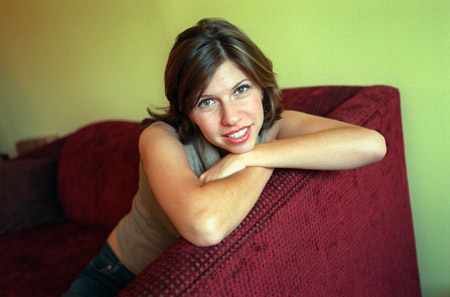Lights, camera, ‘Dance by Design’
Med School Ph.D. student and crew make a full-length film on weekends

A young woman stands at a crossroads in her life, unsure of which path to take. Should she fulfill her father’s dream and become an architect, or should she follow her heart and try to make it as a professional dancer?
This is the premise of a feature film, “Dance by Design,” now undergoing final editing by its executive producer/ director, Valerie Weiss.
The film was made by Weiss, a Ph.D. student in Harvard Medical School, with a cast and crew made up largely of other Harvard graduate students. Weiss plans to enter the film in the next Sundance Film Festival competition in January 2002.
Like the heroine of her film, Weiss has a background in the performing arts, but “Dance by Design” is no autobiography. Unlike her heroine, Weiss has not been stymied by the need to make a choice between careers. In fact, she has shown that it is quite possible to make significant progress on several paths at once, and she has encouraged and helped others to do the same.
Drawing on her experience in acting and directing, Weiss became a drama fellow at Dudley House in 1999, the year she began her graduate studies. She directed two student plays over two years, but by the following year she felt the need to do something different. Having taken a video production course as an undergraduate at Princeton, she decided to start a film program at Dudley House, helping graduate students make short films on a variety of subjects.
Recognizing the limitations of her own knowledge, she decided to supplement it by starting a lecture series, bringing to Dudley House such film luminaries as actress Debra Winger, actor-director Arliss Howard, director Michael Corrente, and producer Mitchell Robbins.
The film program was a success, culminating in a Dudley House film festival at which 15 students screened their productions. But by the following year, Weiss wanted to move on to something else.
“I decided, OK, now I want to do something big and fun and novel,” she said.
Coming home one night from an evening of dancing, she had an inspiration. She would make a feature-length film about dance, something like the 1980s hit “Flashdance.” She stayed up until 4 o’clock that morning writing a treatment and the next day presented the idea to the members of the film program.
Weiss feared that her concept would elicit a lukewarm reception, but many of the students took up the idea enthusiastically, coming up with additional plot suggestions. A writing team formed, consisting of Weiss and six others, and between September and November of 2000 they developed a full-length script.
“I could tell after one or two meetings whose strengths lay in which areas. Everyone had some expertise that made the script richer and more real.”
Casting began in December. Most of the principal roles were played by local professional actors, with students filling in as extras and minor characters. Rafi Landau, a professional cinematographer from Israel, agreed to join the production, and under his direction the film gained a captivating visual appeal. Funding came from Dudley House, the Office for the Arts, and a number of private sources. Nevertheless, the budget was tiny. “I think we might have set a record,” Weiss said.
The film was shot over nine weekends between February and April, working around the busy schedules of the graduate students who made up the production team. The experience was often exhausting with shoots sometimes lasting until six in the morning, but on the whole the process went smoothly.
“No one quit, there was no conflict, we finished on time and under budget. It was fun and so educational. Everyone did it all and we made great friendships. It was like a mini film school, and it was free.”
Remarkably, Weiss was able to finish and successfully defend her Ph.D. dissertation on the crystal structure of an enzyme involved in nuclear transport within cells two weeks after production ended. And as soon as that was finished, she threw herself into the planning of her wedding, which took place on Sept. 30, 2001.
“Planning a wedding is a lot like making a movie. That experience was very intense, too,” she said.




